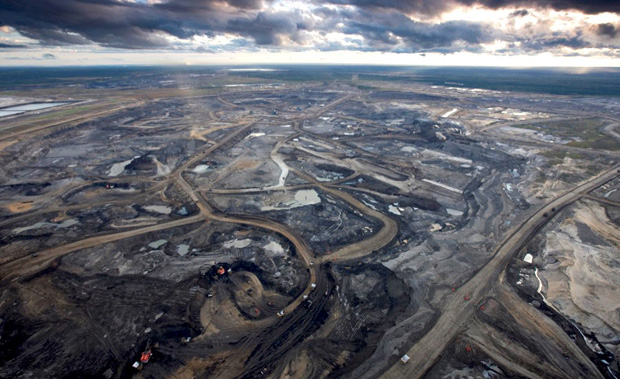Rethinking Lifestyle
Oil is a Scarce Resource

Building a country or a region’s economy on the extraction of a resource is fool hardy. A resource extracted is gone! It is no longer there! Inevitably payday will come, maybe not within our lifetime, maybe not within our children’s lifetime, but it will come. True, by the time that resource is extracted, there may be new technology that reduces our need for that particular resource, but those who believe that have an extraordinary amount of faith in human ingenuity. Surely it is better to avoid building an economy on resource extraction if at all possible.
I’ve been thinking about this a lot these days as I have been monitoring Alberta’s current dispute with BC. As I see it, here is the basic dispute: Alberta has this vast under-exploited resource of oil sands. In order to benefit from this resource, it needs to be sold, and in order to be saleable it needs to be delivered to an ocean port. This oil sand-derived bitumen is already being delivered to oil tanker terminals in BC, but apparently not fast enough. Albertans want to exhaust their oil resource at a faster rate.
BC, on the other hand, says whenever oil moved, spills occur, and the more oil we move, the more likely these spills are. When [not if, they say] that spill occurs, we are the ones who will lose – not Albertans. The benefit is just not worth the risk..
Boom and bust is a part of a resource economy. Consider Lynn Lake here in Manitoba. When mining in Lynn Lake was at its peak, that town had 3,500 residents. Today there are 675. Thompson, not far away, is well aware of its dependence on its nickel mine, and is consciously working to diversify. The prosperity of Alberta does not need to be dependent on oil, but an oil focused development policy will create that dependence.
What set Alberta off in the development of its oil potential was the discovery of an oil well in the Turner Valley southwest of Calgary. That was in 1914. At that time it took about a barrel of oil to extract, process, refine, ship and deliver 100 barrels of oil. Now, conventional oil production worldwide pays off at about a 20-to-1 ratio. And in Alberta, where the oil now comes from tar sands, it’s closer to 5-to-1. In the early 20th century, no one would have considered extracting oil from the oil sands. Today it is the oil sand potential that is driving the Trans-mountain Pipeline expansion. Furthermore you can be sure the oil now being extracted is the most accessible. Extracting and processing will become increasingly more expensive, and as it becomes more expensive, the industry becomes more vulnerable to other economic shocks.
Norway was not considered a resource rich country until the 1960s when oil was discovered off the coast of Norway. Nevertheless, when Norway began to pump that oil, that country decided, rather than to allow the country to evolve [or devolve] into oil dependency, it would use its oil revenue to develop other sectors of the economy. Norway instead chose to invest the revenue from the oil in a development fund. On the World Economic Forum’s inclusive development index, Norway now tops the list, in no small part because to this decision.
Let’s face it. When a country or a region views itself as resource rich, and ties its well-being to the extraction and sale of that resource, it is impoverishing itself. It is shooting itself in the foot. There is no long term future in that.




